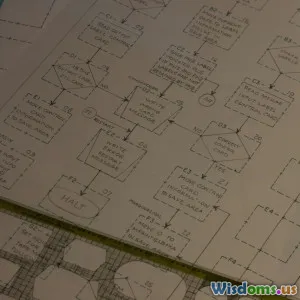
Navigating Family Dynamics with Grace
7 min read Master the art of handling complex family relationships with empathy and tact. (0 Reviews)
Navigating Family Dynamics with Grace
Family relationships are often a beautiful, intertwined tapestry of love, history, conflict, and growth. Yet, they can also be the most complicated and emotionally charged connections we face. Successfully navigating these dynamics with grace is not only an art but a valuable skill that enriches our lives and deepens our bonds.
Introduction
Every family harbors its own unique patterns, rules, and challenges. Whether it’s a holiday gathering with unresolved tensions or everyday interactions marked by hurt or misunderstandings, these moments test our patience and emotional intelligence. Grace, in this context, means approaching these situations with empathy, respect, and emotional maturity without losing our authenticity.
But what does it truly take to handle the intricacies of family life gracefully, especially when feelings run deep and past grievances linger? This article unpacks the key components of navigating family dynamics thoughtfully and effectively, supported by psychology research, real-life examples, and practical strategies.
Understanding the Complexity of Family Dynamics
Families operate as complex systems where each member influences and responds to the others. According to Family Systems Theory, behaviors, communication styles, and emotional responses are often shaped by long-standing family rules and roles. For instance, the “peacemaker” sibling may habitually avoid conflict, while the “rebel” might be outspoken to disrupt the status quo.
Recognizing these roles and patterns can help individuals see the bigger picture rather than getting caught up in personal hurts. For example, acknowledging that a parent’s critical tone stems from high expectations or unresolved anxiety can create empathy instead of resentment.
Example:
Sarah often felt her sister was overly judgmental. After family therapy sessions, she realized her sister’s criticism was less about Sarah’s faults and more related to the sister's own insecurities and previous family pressures. This insight transformed Sarah’s response from defensive to compassionate.
Communication: The Cornerstone of Graceful Navigation
Graceful communication is not about avoiding difficult topics but engaging in them with honesty and kindness. Clear, respectful communication allows family members to express their needs and frustrations without triggering defensiveness.
Some strategies to improve family communication include:
- Active listening: Focus fully on the speaker, reflect back what you heard, and validate feelings.
- Using "I" statements: Express feelings from your perspective without blaming (e.g., "I feel hurt when...").
- Setting intentions: Clarify that the goal is understanding, not winning an argument.
Example:
A father and adult son struggled with miscommunication. The father would lecture, and the son would shut down. By switching to a three-step approach—listening, asking open-ended questions, then sharing his perspective—the son noticed less tension and more openness.
Managing Conflict Without Damage
Conflict in families is inevitable but doesn’t have to erode bonds. Conflict managed with grace involves acknowledging differing viewpoints, regulating emotions, and seeking compromise rather than victory.
Pioneering relationship researcher John Gottman highlights the four “horsemen” of destructive communication: criticism, contempt, defensiveness, and stonewalling. Avoiding these harmful patterns and fostering positive interactions (like appreciation and gentle humor) can drastically improve family relations.
Practical Tips:
- Take a break when emotions run too high.
- Address issues promptly before resentment builds.
- Use mediation when direct communication stalls.
Establishing and Respecting Boundaries
Healthy family dynamics depend on clear boundaries — limits that protect emotional wellbeing and respect personal space. Boundaries may involve topics that are off-limits, physical space preferences, or time allocated for family versus personal activities.
Setting boundaries can be challenging but ultimately leads to greater respect and less resentment. For example, gently but firmly telling a relative, "I appreciate your concern, but I don’t want to discuss my career choices right now," preserves peace and autonomy.
Cultivating Empathy and Forgiveness
Empathy involves understanding and sharing the feelings of family members, even when their actions frustrate us. It helps break cycles of blame and creates openings for forgiveness — a key ingredient in letting go of past hurts.
Studies reveal that forgiveness can reduce stress, improve mental health, and strengthen relationships. Forgiveness does not mean condoning harmful behavior but choosing to release persistent anger.
Real-World Insight:
In a multigenerational family conflict, the grandmother shared stories of her hardships, helping younger members understand her strictness stemmed from survival fears, not spite. This empathy led to reconciliation and deeper mutual respect.
When to Seek External Support
Sometimes family dynamics require external intervention. Family counseling or therapy can provide a neutral space to air feelings, learn communication techniques, and heal wounds.
Professional help becomes especially vital in cases of abuse, addiction, or trauma, where unmanaged issues deeply impact the entire system. Early intervention prevents long-term dysfunction.
Conclusion
Navigating family dynamics with grace is an ongoing journey that calls for patience, emotional awareness, and a willingness to grow. By understanding family roles, communicating openly, managing conflict wisely, establishing boundaries, and fostering empathy, we can transform even the most difficult relationships into sources of strength and joy.
As the poet Maya Angelou wisely observed, "We are more alike, my friends, than we are unalike." Embracing this truth within our families enables us to move forward with kindness and grace, nurturing connections that last a lifetime.
Rate the Post
User Reviews
Popular Posts



















